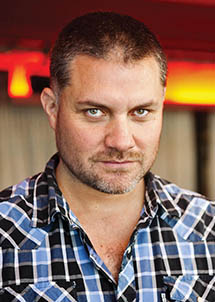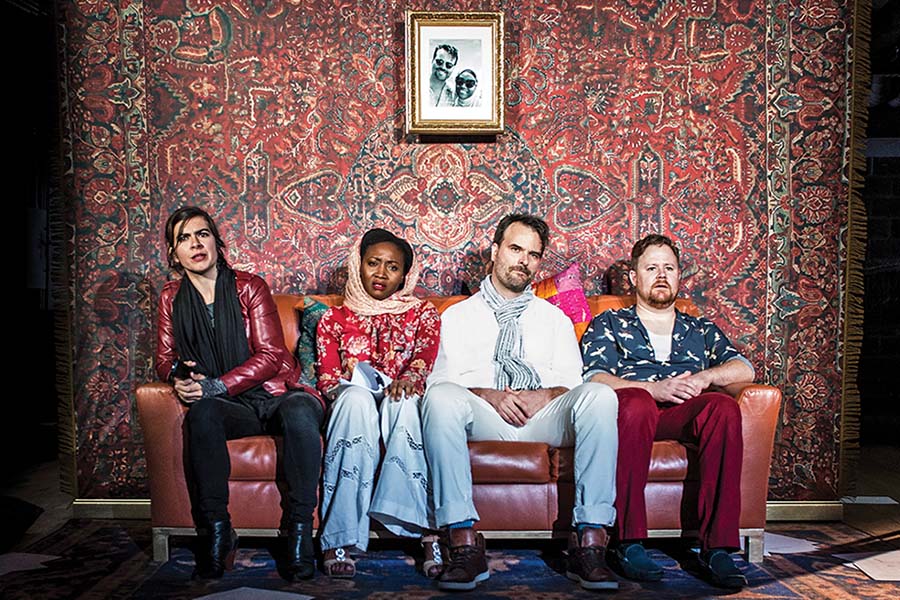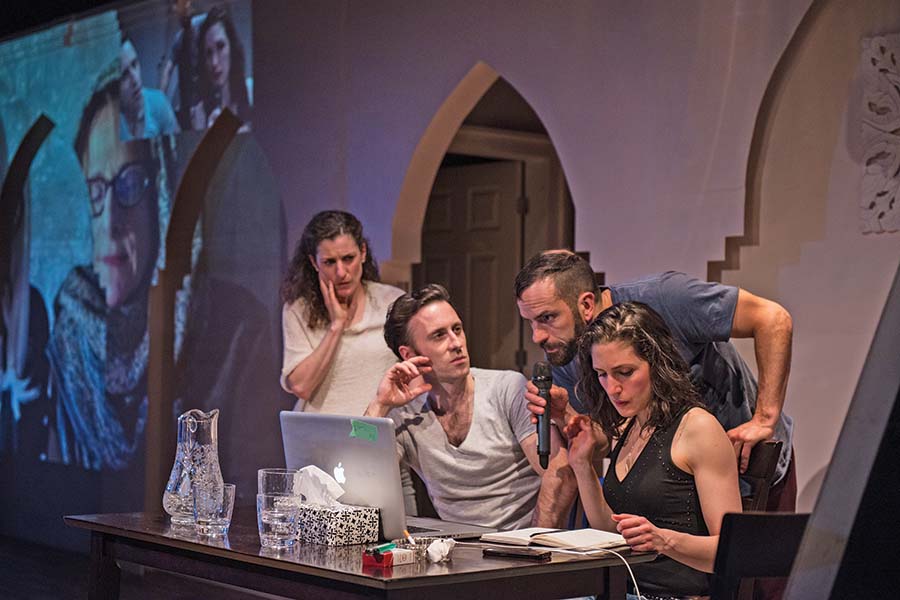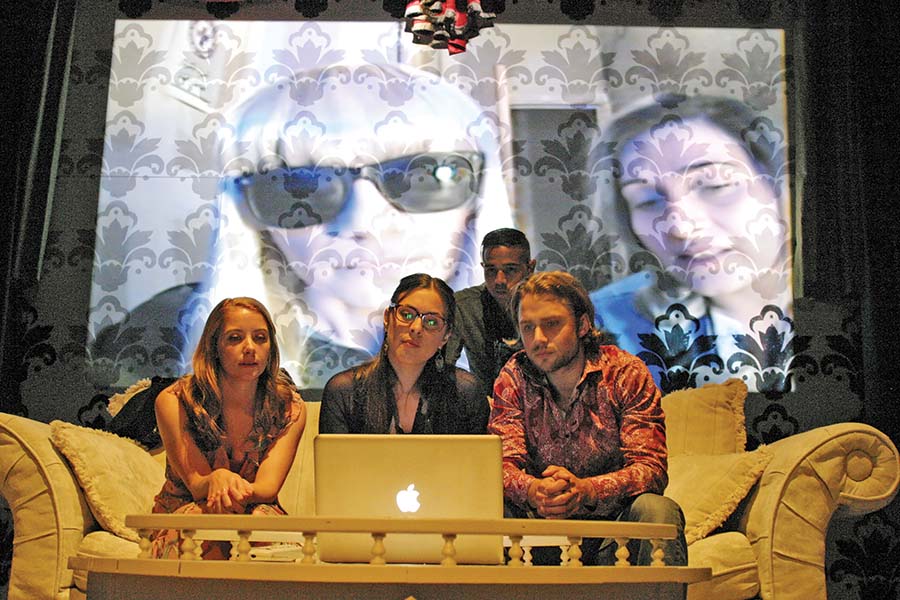
Guillermo Calderón’s play Kiss, which will have its next run Oct. 26-Nov. 19 at ArtsEmerson in Boston, was the first play he wrote in English, but it’s a departure in another way too. While his previous plays (Villa, Escuela, Diciembre) dealt with his home country of Chile and the long shadow of the repressive Pinochet regime, Kiss addresses, in its own metatheatrical, self-interrogating way, the civil war in Syria: It follows the well-meaning but mistaken efforts of a theatre troupe in a Western country to stage a Syrian soap opera whose momentous implications they misinterpret. In this conversation with Elyse Dodgson, international director of London’s Royal Court Theatre, where Calderón’s newest play, B, begins performances this week, Calderón talks about his inspiration for the play, and how he finds hope by looking backward.
ELYSE DODGSON: When we first spoke about Kiss, you talked about how you were so moved by what was happening in Syria, and so frustrated by being outside of it. You often write about situations that you know very well, and that are in your blood. So I’m quite fascinated by how you tell the story you wanted to tell.
GUILLERMO CALDERÓN: I have been writing about my country for a long, long time, and then when I was invited to develop this play for the Dusseldorfer Schauspielhaus, I decided to force myself to write something different, with the same human subject matter I have been writing before, but also trying to explore what was really urgent, which was the war in Syria. I was reading the newspapers, and every single day the news was getting worse and worse. The number of people killed and displaced was growing to an amount that was unimaginable. I thought, “Well, I would love to write about this. This is something that means a lot to me. It’s urgent.” But there’s one problem with this, which is that I don’t know about the culture. I don’t speak the language. I’ve never been to Syria, or to the region for that matter. But I think that for me this is urgent, and I think that theatres should reach out and try to address this war and this tragedy in any way possible. So I decided to write a play about the war in Syria, but also about a misunderstanding about Syrian culture.
That’s when I thought, maybe this is a play about how theatre aims to reach out across cultures in a sort of an earnest and genuine way, but at the same time fails at doing it. It’s still worthwhile; in this play, misunderstanding is not a roadblock for theatre. Theatre is going to push through, even risking failure.
I love that, because it’s such a problem, and you just hit it head on. I probably have a tendency to ask writers in a country to tell their stories from the inside, but at the same time we don’t want to just say to writers, “You can only write about your culture or what you know.” You really have to have the possibility to write about what you don’t know, as long as you do it with integrity and as long as you can push beyond the misunderstandings.
I come from Chile, and my country’s very isolated in many ways. We have the tendency of talking about ourselves in theatre, exploring our issues endlessly, without having a window into what’s going on in the world. Sometimes we miss a voice from the outside. I would very much welcome a Syrian writer writing a play about Chile, just to see a different perspective—to see a respectful, hopefully intelligent take into Chilean issues. Theatre and culture need cross-pollination. We need a healthy dose of misunderstanding as well. We need the dirty, complicated relationships, because those are the ones that allow us to create new relationships and the understanding of what’s going on in our culture and in other cultures.

I totally agree. Too often you see that if you do it from the perspective of the characters that the host culture can understand, you’re not making those leaps in understanding.
For me it was really interesting. I don’t come from the “center of the theatre world.” But this was an occasion in which I, a writer from Chile, was writing about Syria, yet another country which is not part of the “center,” and doing it from Dusseldorf, which is actually the center of a theatre culture—as part of Germany, of course. It is kind of a pity, or sort of a complication, that we are still using the platform of a center of the theatre world to do this dialogue between cultures who are outside the center. Nevertheless, I’m going to take the opportunity to do it, because that’s what allows me to reach there.
In the case of Kiss, having originated in Germany allowed me to finish the play. I needed an extra actor, and Dusseldorf Theater reached out and found a singer and a social worker from Syria. She was the inspiration for the character who appears in the play as the woman on the other side of the Skype conversation. I wanted the raw naturalism of a non-actor, and since she was a Syrian, she would talk to me about the reality of her family living in Aleppo. Of course she would introduce me to Syrian culture as a whole and give me really down-to-earth, non-religious, completely secular perspective of what was happening in Syria. For me, it was very, very rich to be able to go to Germany and find Syrian culture in exile as a refugee there.
The play starts as a misunderstanding thing, because I don’t know one thing about Syria, but theatre itself allows me to finally reach out to Syria and find a real encounter between the two cultures there. For that I’m really grateful.
How was it received?
I think that the play got a really good reception. People really appreciated the strangeness of this guy, an outsider from Chile, writing about Syria, and that inspired interesting conversations about what it means to talk about another culture. For me, there was a sense of danger as well. This actress from Syria was very much afraid of the consequences of the play—that police from Assad’s regime were going to find her in Dusseldorf or retaliate against her family in Aleppo. We describe her character as wearing a wig and sunglasses, but that was actually something that she requested, because she didn’t want to be recognized onstage as this person; she didn’t use her actual name in the program notes. For her the danger was real. I can’t say this was the same for the audience, but for us—the people involved in the production—it was a really sort of subtle way to bring just a little drop of the danger of the war into our production.

It was a rude awakening for me to realize that Assad forces have so much power outside of Syria. Not only do they, of course, terrorize their country, they also reach out to different parts of the world, so that every Syrian is afraid of what they can say or not say beyond their frontiers. In my comfortable life I assumed that when people step out of Syria they find some sort of peace, but of course they don’t. They feel completely destroyed by what has happened to their country, and the fear keeps going. The trauma is going to be long-lasting, and it’s never going to completely go away.
In your work about Chile, that’s what it’s all about. I remember the first conversation I ever had with you, in which you said that because of the way you were affected by the dictatorship, you almost vowed that all your work would contain something of that experience.
Yeah, definitely. I grew up during the dictatorship, and it was over only when I was 18 years old. For me to do theatre, and to direct, to write—it’s basically a way to keep expressing my anger and frustration over those years. And this is not necessarily looking backwards, because in my experience trauma has a way of being passed from grandparents to sons and daughters, and from them to grandchildren. When I look at my country I see that a lot of young people are as angry as the previous generation was with the effects of a dictatorship. So I think that this trauma that has affected Syria is not going to be over when the war is over, of course, and it’s not going to be over 20 years down the road. It’s going to be an integral part of Syrian society, as in most societies who have undergone similar situations.
As you know, I’ve worked with the next generation of writers in Chile. I have Pablo Manzi at the Royal Court at the moment writing and working on a new play, who’s just really at the very beginning of his career as a writer. It’s interesting that the obsession is still the same even for a young Chilean writer who’s not lived through the dictatorship at all but who’s dealing with it in different ways.
I’m going to say that the younger generation has a big sense of having missed out on the dictatorship. Not because they long for the dictatorship, but they wish they had fought the dictatorship. There’s an intensity, a clarity of purpose, a sense of hope in which the world is going to be all right, and the possibility of everything changing, when you take down a regime and build a new society—there was a sense of optimism within the struggle against the dictatorship. But the younger generation has grown up in a society that only offers you a path of professional success and to develop a personal life; those are not big inspirations to live by. That big blanket of pessimism that we live under is the neoliberal society; what neoliberal society basically offers us is something that we need to get rid of. Sometimes it’s so overwhelming that it’s easier to connect with the past, in that the past was very full of despair but was also at the same time combined with a sense of optimism toward the future.
That’s fascinating.
I can definitely see younger writers looking backwards.
I see them looking backwards, but I’ve never had an explanation for that as clear as what you’ve just said. The new play that you’re working on with us, B, deals with at least two people of that younger generation. Could you say something about how that relates to that trauma?
For me what’s really important in B is to explore the eternal lure of violence. So I decided to write this play just to address this idea of violence. I did in the context of Chile, but of course it was this metaphor in which people are discussing how to stop being violent—how planting bombs sort of brought them to a dead end, and what does violence mean for them emotionally and politically? And how violence is an expression of trauma and also an expression of liberation in the other context.
In Chile and in all these wars, one is not inclined necessarily to fight for pacifism. One is inclined to see, how can Assad can be stopped—how can all this violence exercised by the government be stopped? And of course a lot of people think that they can be stopped only by responding with more violence. But if we call ourselves pacifists and we reject the idea of violence in politics, are we going to stop the legitimate right of the victims of Assad’s violence to defend themselves? What is our position regarding the intervention of other countries—militaristic interventions in order to stop the violence?
In a way, and going back to your original question, for me it’s an expression of leftover pessimism. Again, I think that looking backward to give you a perspective into the future is going to the past to seek a place for optimism, because our moment right now is very difficult. It’s a moment of pessimism in which we doubt the future very much. So to address what’s going on right now, I thought I’d write a play about people reaching a dead end; when plays reach a dead end they can be about pessimism, but at the same time it’s theatre, it’s art, so when political ideas reach a point of pessimism there’s always a possibility of creativity, of gathering around the village to think collectively, feel emotions collectively, experience theatre collectively.
That’s fascinating.
Kiss is a very optimistic play in that, of course it deals with war and it deals with misunderstanding, but it also upholds the idea that theatre artists are not going to be stopped. Even when they feel like they have completely misunderstood Syrian culture and a play from a different country, they’re going to push through anyway, because they believe not only in their convictions—they also believe in the possibilities of theatre. So they’re not going to be stopped.
That’s beautiful. It is a real ray of hope for those of us who work in the theatre, see why we do it. I read somewhere that you said something like, “I want to create political problems for audiences.” Is that true?
Yeah, I usually dislike when people come out of a theatre talking to each other about a certain performance, or if the play was good or not. I like it when they get out of a theatre and they ask each other, “Oh, forget about the play, let’s talk about the ideas of the play.” That for me is one of the good reactions I expect from audiences. Plays shouldn’t be easy. They should be complicated and they should be slightly impossible to solve. Political problems tend to be so complicated that we tend to reach out for simplicity. We should always escape the idea of simplicity, because simplicity is the promise of fascism, right?


